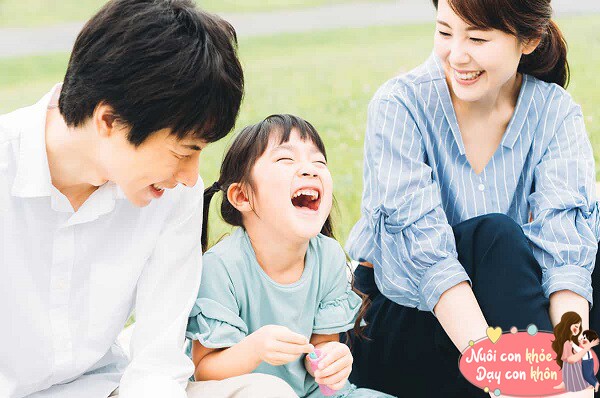In this oasis, children need to be given the space to explore and challenge themselves, and each fall will become a stronger foothold to stand on. Parents also need to learn to let go at the right time and let their children take the wheel.
Even when facing rough seas, children can rely on their inner compass to steadily sail to the shore they have chosen. In this way, they can confidently and courageously face various situations in life.

Bi Shumin once said: “With a broad heart, children can restrain their joy, anger, and gain strength.”
Those with strong hearts often possess these qualities, which will bring benefits throughout life. They are confident, assertive, and do not deny themselves because of others’ excellence.
With a positive and optimistic mindset, children can enjoy the good and accept the bad. Their strong emotional regulation skills will not let them fall into negative emotions but focus on problem-solving.
Whether a child becomes mentally strong or weak later in life is closely related to their parental upbringing. It is essential to do these three things well.

Accept and Fully Support
Love and safety are the foundation.
Children who grow up in a family filled with love and warmth have a strong sense of self-worth, feel secure, and are confident and courageous enough to face failures.
The best way to make children feel loved is to establish a sense of safety, acceptance, and support from their parents.
Acceptance mainly includes two aspects. One is accepting the child for who they truly are.
In reality, many parents have high expectations and strict demands, wanting to turn their children into “perfect” beings as they imagine. The message conveyed is that the child is only loved if they excel and meet these expectations.
As a result, children will continue to work hard to meet these demands, but their true selves and inner thoughts will be suppressed over time, lacking a sense of security and worth.
The drawbacks of this educational approach are also evident, with an increasing number of teenagers overwhelmed by pressure, depression, and many students from prestigious schools suffering from “hollow sickness,” unable to find their path in life, self-reliance, and a decrease in self-worth, leading to self-negation.

Accept and fully support.
Psychological research shows that the human heart only matures when accepted. If childhood is oppressed by excessive education and ideals, and the true self is not accepted, intellectual growth will stagnate.
Whether the child excels or not, parents should accept their true selves and, on this basis, use love and encouragement to accompany their growth and gradual progress.
Children who are fully accepted will truly love, trust, and have inner strength. This also includes accepting the child’s emotions.
When children are sad, angry, or disappointed, parents should empathize and understand their feelings.
This attention and guidance will make children feel recognized and understood, daring to express themselves truly and learning to regulate their emotions.
The support that parents provide is mainly spiritual, especially when children make mistakes, perform poorly, or face failures. Parents can face their children’s issues, offer comfort and encouragement instead of denying them because of their achievements.
In this way, children will not fear making mistakes and encountering failures. Through repeated experiences, they can cultivate their willpower, learn problem-solving skills, and develop a positive mindset.
At any time, children who feel unconditionally loved and trusted will be more determined, confident, and courageous in facing life’s challenges and trials.

Encourage Trial and Exploration
Erikson, a renowned American psychologist, divides the human psychological development process into eight stages, each with corresponding tasks to complete.
During this phase, encouraging exploratory behavior will foster proactiveness and creativity in children.
If their initial behaviors are constantly mocked and attacked, guilt will surpass proactiveness, causing a gradual loss of confidence.
When Edison was in elementary school, he was curious about his school’s new teaching aids. He took them apart and couldn’t put them back together. His teacher was so angry that she invited his mother to school.
The teacher told Edison’s mother: “Your son likes to take things apart too much. You must change this habit!”
Edison’s mother firmly believed that this was her son’s greatest strength: “Teacher, I think you’re wrong. I’ve observed my son for a long time, and the most significant difference between him and others is his interest in taking things apart. If you ask him to change, will he agree, just like everyone else?”
Could a human hatch a chick? With this question, Edison embarked on his journey to become a renowned inventor.

Encourage trial and exploration.
His mother’s wisdom, appreciation, and encouragement of Edison’s curiosity allowed him to unleash his imagination and creativity, constantly seek knowledge, and explore, ultimately achieving fame.
When children are young, behaviors that seem like “mischief,” such as taking apart toys, picking up stones, or playing with water, are actually processes of exploration and discovery.
From a developmental psychology perspective, trial and exploratory behaviors are essential for children to develop their abilities, understand themselves and their surroundings, and accumulate life experiences.
If parents constantly protect and restrict their children, it will hinder their growth and ability development.
More importantly, children lack life experiences and cannot recognize their capabilities. Over time, they become weak, prone to avoidance, withdrawal, and easily overwhelmed by challenges.
Therefore, when children start to speak, run, jump, and want to do everything, parents should create a suitable environment within safe boundaries, allowing them to try various activities they are interested in and make progress.
Stepping into puddles, catching insects, running, jumping, and helping parents with chores… Children gain rich life experiences through practice and personal exploration, gradually building trust in their environment and developing courage, self-control, and a welcoming attitude.
By letting go and giving children the space to develop freely, they can discover their passions and strengths through continuous efforts and experiences while also fostering a strong inner self.

Learn to Make Decisions and Choices
Many parents always feel they have decades more experience than their children, so they guide their lives and intervene in their choices, regardless of their actual thoughts and needs.
Even minor decisions, such as what to wear, which toys to play with, what to eat, which books to read, or which hobby classes to enroll in, and major life choices like whether to pursue arts or sciences, which major to choose, career paths, and even marriage partners, are often made by parents, and children passively accept these decisions.
Under this arrangement, children feel dependent on their parents. They get used to avoiding responsibility and find it challenging to mature genuinely.
American social psychologist Grant Halvorson wrote in his book, “Success, Motivation, and Goals”:
“Children crave happiness in a sense of belonging, growth in newness, and intrinsic motivation in free choices.”
Feeling that they can decide and choose for themselves is essential to developing proactiveness and inner strength in children.
Therefore, when children cannot follow their desires and ideas and must obey their parents’ arrangements, they develop a negative mindset, laziness, passivity in work, and a weak sense of responsibility. They lose self-control and gradually diminish their self-confidence.

Learn to make decisions and choices.
This state is naturally detrimental to their development and progress.
There is a Western proverb: Experience is the best teacher. So, let children try to make their own choices from an early age and bear the consequences of those choices. This way, they will learn to think through the process, proactively adjust their behavior, and optimize their decisions.
As a result, when faced with crucial decisions and choices in the future, they will not be afraid but will have the courage and wisdom to make the right ones.
For example, allowing children to decide when to do their homework, how to plan their allowance, or manage their time during vacations is actually a way to cultivate responsibility.
Their awareness and proactiveness will increase, and they will gradually learn to think independently and self-manage.
What parents need to do is inform their children about the possible consequences of a particular choice when necessary, help them analyze the pros and cons and finally let them make their own decisions.






































